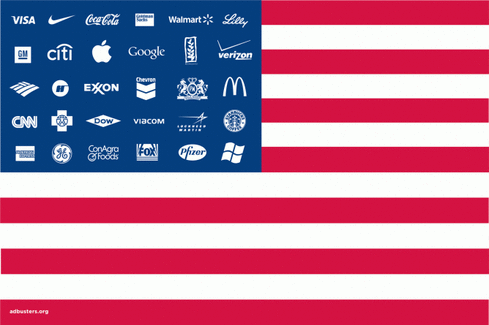Did you know on any given day the typical American takes in around 5,000 advertisements? When I first read this stat I didn’t quite buy it as that number seems incredibly high. Recently on a whim I decided to test if this was at all accurate in my experience. For thirty minutes I was going to be conscious and actually count the amount of advertisements I saw. I actually did this on two different occasions one where I was using a computer and another time when my wife and I were out on a drive. And from this experience I would say that 5,000 is almost a conservative estimate. Once you begin opening your eyes you see ads and logos everywhere. Billboards, signs, tshirts, logos, car brands and bumper stickers, Facebook and google ads, brands spotted not only on tv commercials but displayed all throughout any given movie or show, friends plugging products in social media...the list can go on. Take 30 minutes on an average day and put your own experience to the test. It is completely overwhelming. And I would argue it is to our detriment.
The ads are very effective. And we all know them. There are popular apps where you can guess how many logos you recognize and you might be amazed how many you do actually know. Try out a similar web version to see for yourself. We are saturated with ads that often serve to nourish our desires and strangle our souls. In 2010 the irreverent Logorama won the Oscar for best animated short as it takes a satirical look at our society driven by ads. Take a look below but be forewarned of the adult language.
The ads are very effective. And we all know them. There are popular apps where you can guess how many logos you recognize and you might be amazed how many you do actually know. Try out a similar web version to see for yourself. We are saturated with ads that often serve to nourish our desires and strangle our souls. In 2010 the irreverent Logorama won the Oscar for best animated short as it takes a satirical look at our society driven by ads. Take a look below but be forewarned of the adult language.
Logorama from Marc Altshuler - Human Music on Vimeo.
Ralph Nader, the consummate consumer advocate, outlines how corporations once existed to meet our needs but have since progressed into something more in his new book The Seventeen Solutions.
“For decades, our corporate economy has been shifting its focus from fulfilling basic human needs (food, shelter, warmth) to fulfilling (and creating!) more trivial wants and whims. From commercial entertainment, video games, and spectator sports, to stylized snack foods, communication gadgets, and even redundant weapon systems, corporations have invested billions of dollars into research and development (R&D) on items that rob consumers of endless amounts of their not-so-disposable income. And this continues even though large segments of the population are suffering from inadequate nutrition, employment, capital ownership, shelter, transportation, and health care coverage.”
And boy are they successful at developing “more trivial wants and whims.” Upon self examination I regretfully find myself dwelling more often upon unnecessary self centered wants than my ideals of selflessness, compassion, justice, love, friendship and doing/giving things for others. To be critically honest if you were to total up my thoughts and put a check in one of two columns for every single thought there is rarely a day that I choose God over Mammon.
Can you blame me though? There is just so much great stuff available today. Only half jokingly I really am curious what people in the time of Jesus lusted after that lured them to the side of mammon. A new wine skin? A nice robe? Some sheep? Mustard seeds? Wooden Grails? A fancy outhouse? Delicious bitter herbs and spices? I mean check out this cool painting entitled The Worship of Mammon from the early 1900’s and what is appealing? There is an alluring man (maybe) with a bag of gold. Compare to my updated version for the 21st century.
“For decades, our corporate economy has been shifting its focus from fulfilling basic human needs (food, shelter, warmth) to fulfilling (and creating!) more trivial wants and whims. From commercial entertainment, video games, and spectator sports, to stylized snack foods, communication gadgets, and even redundant weapon systems, corporations have invested billions of dollars into research and development (R&D) on items that rob consumers of endless amounts of their not-so-disposable income. And this continues even though large segments of the population are suffering from inadequate nutrition, employment, capital ownership, shelter, transportation, and health care coverage.”
And boy are they successful at developing “more trivial wants and whims.” Upon self examination I regretfully find myself dwelling more often upon unnecessary self centered wants than my ideals of selflessness, compassion, justice, love, friendship and doing/giving things for others. To be critically honest if you were to total up my thoughts and put a check in one of two columns for every single thought there is rarely a day that I choose God over Mammon.
Can you blame me though? There is just so much great stuff available today. Only half jokingly I really am curious what people in the time of Jesus lusted after that lured them to the side of mammon. A new wine skin? A nice robe? Some sheep? Mustard seeds? Wooden Grails? A fancy outhouse? Delicious bitter herbs and spices? I mean check out this cool painting entitled The Worship of Mammon from the early 1900’s and what is appealing? There is an alluring man (maybe) with a bag of gold. Compare to my updated version for the 21st century.
The appeal of wealth and materialism has more magnetism than ever before and that spells trouble for you and for me. In study after study it is shown that wealth, materialism and “keeping up with Joneses” rarely leads to happiness. Advertising and a culture of consumption create competition rather than community, poor body image instead of self acceptance, obesity and addiction rather than health, and insatiable desire instead of contentment...a primary key to well being. But what can we do to combat this mammon with its billions of dollars and a strategy that is very effective at turning us into consuming zombies? (que clip of zombies in a mall from Dawn of the dead)
As is the case with pervasive problems there is no easy answer. There must be individual and societal changes. As a country we can take small steps following the example of locales like Sao Paulo, Brazil that in 2007 banned outdoor advertising and more are making calls to do the same. Cities across the world are placing a limit on ads and this is already place in many US states including Vermont, Maine, Hawaii and Alaska. We must realize as a people that it is not always “the economy, stupid” but often our overall well being is at odds with corporate power, money and influence. Change must happen on the policy and grassroots level to reflect this truth. It is we the people, not we the corporations.
We as individuals must learn to turn away from wealth and consumption and toward the good gods of this world: charity, compassion, light and goodness. Possible? Yes. Simple? Hell no. I have a few helpful tips that might be beneficial. We must learn to focus on gratitude and develop this attribute. When gratitude is dwelling in your heart it is difficult to be filled with want. Learning to be content is not the most American ideal but it is critical to developing lasting happiness which is much more important than growing an economy at the expense of shrinking our souls. Essentially we must learn to live the two great commandments and choose God and others over ourselves. If we are actually living this “higher law” it is difficult to imagine being obsessed with Xboxes and Ipads, homes and holidays or essentially anything that does not go to lifting the lives of others or building the kingdom of God, the kingdom of justice, equality and love.



 RSS Feed
RSS Feed